The Outer Worlds diary part 3: Lifestyles of the rich and fragrant
A story of betrayal, and hard-earned respect.
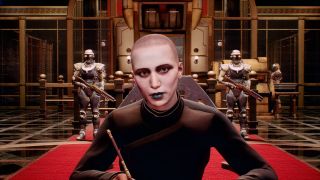
Welcome to part three of our Outer Worlds diary series. Catch up with our company man's adventures in part one and part two.
Phineas Welles’ last day as a free man began with a handful of caffenoids—all the punch of a morning coffee and none of the warmth. Then breakfast: a crisp tumour from the neck of his only companion, a cystipig named Bubbles. Disgusting, but ethical, and perhaps crucially for a man who’s spent 35 years hiding out in an asteroid field, renewable. The fugitive life has a way of stripping away little luxuries.
It’s a far cry from life at the Halcyon Holdings Corporation Board, where my stock is rising. Having proven myself in the corporate environment of Spacer’s Choice, I’ve promised information to Chairman Rockwell, which has got me here, to the gates of Byzantium.
The red carpet starts practically at the foot of Adjutant Akande’s landing pad, which has been reserved for my arrival, as if I’m showing up to the premiere of the movie of my own life. All this privilege has cost me is an addiction to painkillers and a set of coordinates: the location of Phineas Welles’ secret base. Honestly, I’ll be doing him a favour—everything’s so much shinier here.
I ask ADA, the ship’s computer, to play a blast of my favourite song—a sprightly Spacer’s Choice advertising jingle, basically the Pina Colada song of 2355—and step out into the capital. The window of the landing pad offers a glimpse of Byzantium’s skyline. It’s a tall, but essentially flat city: prefab roofs all reaching to roughly the same height, giving the sense of an upper floor, a higher level of hierarchy. Only transport vessels disturb the smog above.
The guards wave me through a series of automatic doors—they each have a daily conversation quota and dare not exceed it with needless questions. I follow the carpet all the way to the desk of the Adjutant, or rather her personal assistant, Percival Platt.
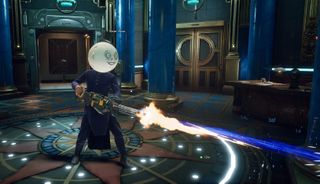
"I see you haven’t been shot to pieces," Platt observes through the spectacles on the very edge of his nose. In fact, the guards in Board HQ don’t wield guns but glowing scythes which hover like vultures over the proceedings, waiting to see whether I’ll be corporate predator or prey.
PC Gamer Newsletter
Sign up to get the best content of the week, and great gaming deals, as picked by the editors.
The face of the Adjutant appears on a nearby screen. Ten corps banded together to buy the rights to this colony, and I’ll need to navigate all their whims, as embodied by this single administrative figure.
"Anyone with eyes can see that you’re talented," she says. "But you’re also unpredictable. I don’t like unpredictable." I ask if she's threatened by my meteoric rise. I’ve made Emerald Vale’s cannery business profitable again. Turned a vicar and a mechanic into unquestioning killing machines. Streamlined HR by terminating ineffective employees with Parvati’s big hammer.
"The difference between you and me is a lifetime of service and dedication," the Adjutant intones. That’s not strictly true: I’ve dedicated my life to the Board too. It’s just that, having been cryogenically frozen for the better part of a century, my life kinda started about a week ago.
Pharoah enough
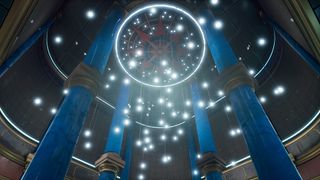
To prove myself reliable, I’ll be retiring a cartographer without pension, if you catch my meaning. It was long believed that in the days of Ancient Egypt, pharaohs would kill their builders so that their tombs could go unplundered. Well, it turns out CEOs are the new pharaohs: Rachel Lockwood of the Bureau of Exploration has carried out sensitive work for the Board, and is now considered a loose end.
What kind of maps did she draw? Knowing that would only make you a loose end too. I’ll bring Lockwood’s notes to the Adjutant, and then we’ll talk about Welles.
I take the lift down to a rather grander lobby than the one I first entered. The employees at Halcyon Holdings HQ dress in finely cut trousers and brightly coloured blazers, making the Spacer’s Choice gear I was once proud to wear look off-world and parochial. I switch to a high boot and mono-lens which I dare say make me look more sophisticated. Out on the immaculately paved street, looming offices and heavy clouds make it difficult to determine the time of day.
Now a couple of hours without painkillers leaves me foggy
I haven’t seen anything this overcast since Judi Dench starred in Cats 336 years ago. A maintenance bot stomps about, its wrist blades either for topiary or security. I pull a syringe from a nearby bin. It’s an unfortunate habit, but a necessary burden of management; huffing drugs has been the only way to vicariously top up the health of my henchmen while I stand at the back, providing constructive feedback on their combat performance. Now a couple of hours without painkillers leaves me foggy and unproductive.
As I rummage through the waste, an office clerk standing outside the Ministry of Accuracy and Morale demands to know what I’m doing. "Nothing," I reply, looking him in the eye. "Nothing at all." He apologises immediately for speaking without signing a waiver. This is the way of the executive: power trumps truth.
Lockwood’s office is staffed primarily by assassins waiting to kill her. A beefy killer named Bradshaw mans reception, and tells me his target hasn’t shown up for days. He’s at the end of his tether, in fact, and gives me the key to Lockwood’s room without protest—just as well, since I wasn’t prepared to spend money on lockpicks. "Looked like an easy job," he despairs. "She’s a map-maker, right? What’s she gonna do—consult her maps and find a good place to hide?"
As it happens, Lockwood’s room is covered in maps, and it’s hard to know which ones might help. But emails on her computer suggest she’s gone underground—literally, into the maintenance tunnels beneath Byzantium. She hasn’t got far, though. I practically stumble over the errant cartographer at the bottom of a ladder.
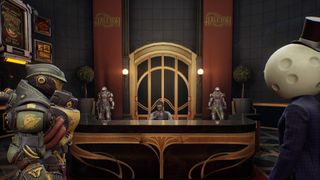
"Get away from me," she hisses. "I’ve got a slide-rule and I’m not afraid to use it." Vicar Max has a shotgun, though, which I order him to make use of. Asking more questions would simply mean spending more time in the sewers, and I’m about ascending the ranks, not exploring the depths. "This is the simple truth," muses Max as we wander back to Akande’s office. "We are all molecular machines. The body is a collection of atoms. The mind is a consequence of chemical reaction. Therefore, our lives are predestined along a path that is only visible in retrospect. Life is fated. And unstoppable."
I like this philosophy, since it rids me of any guilt for my actions. This bloody climb to the top of Halcyon corporate culture is a kind of manifest destiny. If you’ve got an issue, you’re free to take it up with my molecules.
The monitor awakens and an image of the Adjutant fills its screen. "You’ve demonstrated your talents,” she says. “If you’re ready to talk about Phineas Welles, I’m prepared to listen."
The moment I land on the abandoned asteroid facility Welles has repurposed among the rings of Terra 2, his familiar warble comes in over tannoy.
I’m suddenly nervous: amiable though his manner may be, I’m in the lair of a known terrorist and experimental weapons developer. What kind of defences might he turn on me once my aim becomes clear?
There he is, behind glass—out of physical reach, but nonetheless vulnerable. Welles has been sending me messages ever since he shook me out of cryo-sleep, so it stands to reason his base is transmitting a signal. It’s just a matter of making it public.
All's Welles that ends Welles
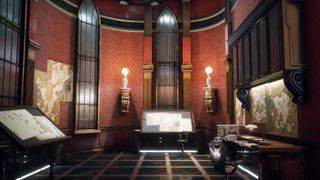
First, though, Welles plays host. "My secret hideout is your secret hideout," he says, and offers me caffenoids. I call him out for waking me from a perfectly good corporate-funded slumber; for loading me into an escape pod and shooting me out into space. He apologises, and suddenly the moment is upon us. The moment in the conversation where, if I’m to warn Welles about the Board’s plot against his life, to change the course of the colony forever and work against the system rather than join it, I should say something. But I let it pass.
Research notes hang from string like drying underwear, detailing Welles’ experiments in avoiding explosive cell death when defrosting organic material. The experiments that led to me standing here. Welles gave me life, and I’m here to kill god.
"Careful," he yells from across the room as I approach a computer. "That’s my communications terminal." I send a tracking signal, establishing a connection with the Board and disabling the lab’s orbital defences. Welles is none the wiser, burbling about his latest shrink ray improvements as I head back to the ship and contact the Adjutant.
"Transmissions are so impersonal," she says. "I’d like to meet you face to face. We need to have a talk about the future of this colony." Am I due promotion, or cremation? Welles’ lab looks peaceful through the window, encased in rock, its rotation undisturbed by all this political thrust.
Walking into the Adjutant’s office back in Byzantium is surreal, like seeing a TV actor in real-life. "I’m curious," she asks. "Welles may have been a delusional madman, but he risked his life to save yours. So why turn him in?"
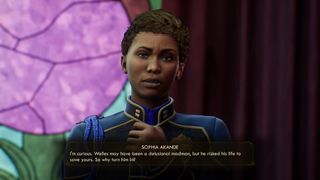
"Welles is a criminal," I reply. "I had to." It’s an answer written for me by Obsidian, but it’s also the truest one I could give. Throughout this journey I’ve been beholden to company policy, only bending the rules as far as they could be reasonably interpreted. With handbook in hand, I’ve ordered killings and betrayed allies, free merely to follow the path predetermined for me by my molecules.
That’s certainly what I’ll tell myself while drinking Purpleberry Liqueur on the terrace that overlooks Byzantium’s central square, anyway.
It’s a drabber city than the one I imagined, perpetually smothered by smog. I couldn’t tell you the direction of the nearest sun. Out in the street, I pass a woman who complains about the smell—my out-of-town smell. She turns out to be Hortense Ingalsbee, a third-generation Byzantium resident whose grandfather was chief idea officer at Tile, the tobacco corporation. Grandpop Ingalsbee picked the font used to sell Stogie Slims, and the colours in Rainbow Chips. Apparently purple was controversial. "My grandfather made millions of bits as CIO," Hortense explains, "and I earned them from him."
It’s clear that while I’m here, I’ll never be of here. The Halcyon colony was sold as a place where I could make something of myself, but that turns out to be a multi-generational project. Ambition can leave you rich and powerful—but it’s legacy that gets you respected. Bollocks. Is it too late to re-roll as a dad?
Most Popular

